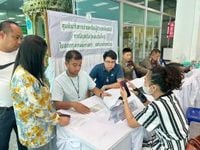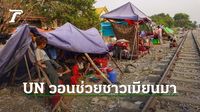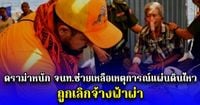On April 6, 2025, the Indian Navy delivered crucial humanitarian aid to Myanmar, which has been grappling with the aftermath of a devastating earthquake. The earthquake, measuring 7.7 on the Richter scale, struck on March 28, resulting in widespread destruction and loss of life. Reports indicate that the death toll has tragically risen to over 3,300, with thousands more injured and missing.
The aid shipment, consisting of 442 tons of essential supplies including rice, cooking oil, noodles, and biscuits, arrived at the port of Tilaw. This assistance was dispatched aboard the INS Gharial, a vessel of the Indian Navy, marking India's prompt response to the crisis. Indian Prime Minister Narendra Modi emphasized the country's commitment to supporting Myanmar during this critical time, stating, "India is doing everything possible to assist our Myanmar brothers and sisters in this hour of need."
Modi's remarks came following his discussions with Senior General Min Aung Hlaing, the head of Myanmar's military government, during the BIMSTEC meeting held in Bangkok. This gathering brought together seven member countries from the Bay of Bengal region, highlighting regional cooperation in times of disaster.
The Indian Ministry of Foreign Affairs reiterated its readiness to provide further assistance, emphasizing the need for a swift return to democratic processes in Myanmar through credible elections. This call for democratic restoration comes amid ongoing military rule that has persisted since the coup in February 2021, which ousted the civilian government led by Aung San Suu Kyi.
In addition to India's support, neighboring countries like Sri Lanka have also stepped up, sending medical teams and supplies to aid the recovery efforts. Sri Lanka's commitment includes over $1 million in financial assistance to support earthquake victims in Myanmar.
As rescue operations continue, the United Nations has also called for international support to assist Myanmar in its recovery. Thom Fletcher, a senior UN humanitarian official, recently visited Mandalay, one of the hardest-hit areas, and reported, "The damage is overwhelming, lives have been lost, homes destroyed, and livelihoods shattered, but recovery is possible." He urged the global community to rally behind the people of Myanmar.
With the situation still dire, the UN Office for the Coordination of Humanitarian Affairs (OCHA) noted that approximately 4,850 people have been reported injured, with 220 individuals still unaccounted for. OCHA has been coordinating relief efforts, emphasizing the need to assist communities that have not yet received aid.
Despite the military government's previous reluctance to accept international assistance, the scale of the disaster has prompted a shift in approach, with requests for help being made. The military regime has faced criticism for its handling of the crisis, especially as reports emerged of continued military operations against opposition groups even after the earthquake.
As the recovery efforts unfold, the government of Myanmar has announced plans to hold free and fair elections in December 2025, aiming to restore some semblance of democracy to the nation. Senior General Min Aung Hlaing, who is currently attending the BIMSTEC meeting in Thailand, reaffirmed this commitment.
In Bangkok, the local government is also mobilizing resources to assist earthquake victims. The Bangkok Metropolitan Administration (BMA) has opened registration for aid applications, which will remain open until April 27. The assistance includes repair costs for damaged homes, temporary housing, and compensation for victims' families.
Deputy Director-General of the BMA, Ekarat Amrapal, outlined the criteria for assistance, which applies to residents whose homes were damaged in the earthquake. Aid packages include up to 49,500 baht for repair materials and 3,000 baht per month for temporary housing, capped at two months.
Furthermore, the government has allocated funds for funeral expenses for deceased victims and immediate assistance for those injured during the disaster. Ekarat emphasized the government's commitment to addressing the needs of affected families, stating, "The state shows concern for the people who have received the impact from the disaster, and will go to help them fully."
As the recovery process continues, the government is working to ensure that aid reaches those who need it most, with a focus on transparency and efficiency. The BMA is coordinating with various agencies to streamline the assistance process and ensure that no one is left behind.
In summary, the recent earthquake in Myanmar has prompted a significant humanitarian response from India and other neighboring countries, while the international community has rallied to provide support. As the situation develops, the focus remains on recovery and rebuilding efforts, with the hope that the people of Myanmar will receive the assistance they need to rebuild their lives.










